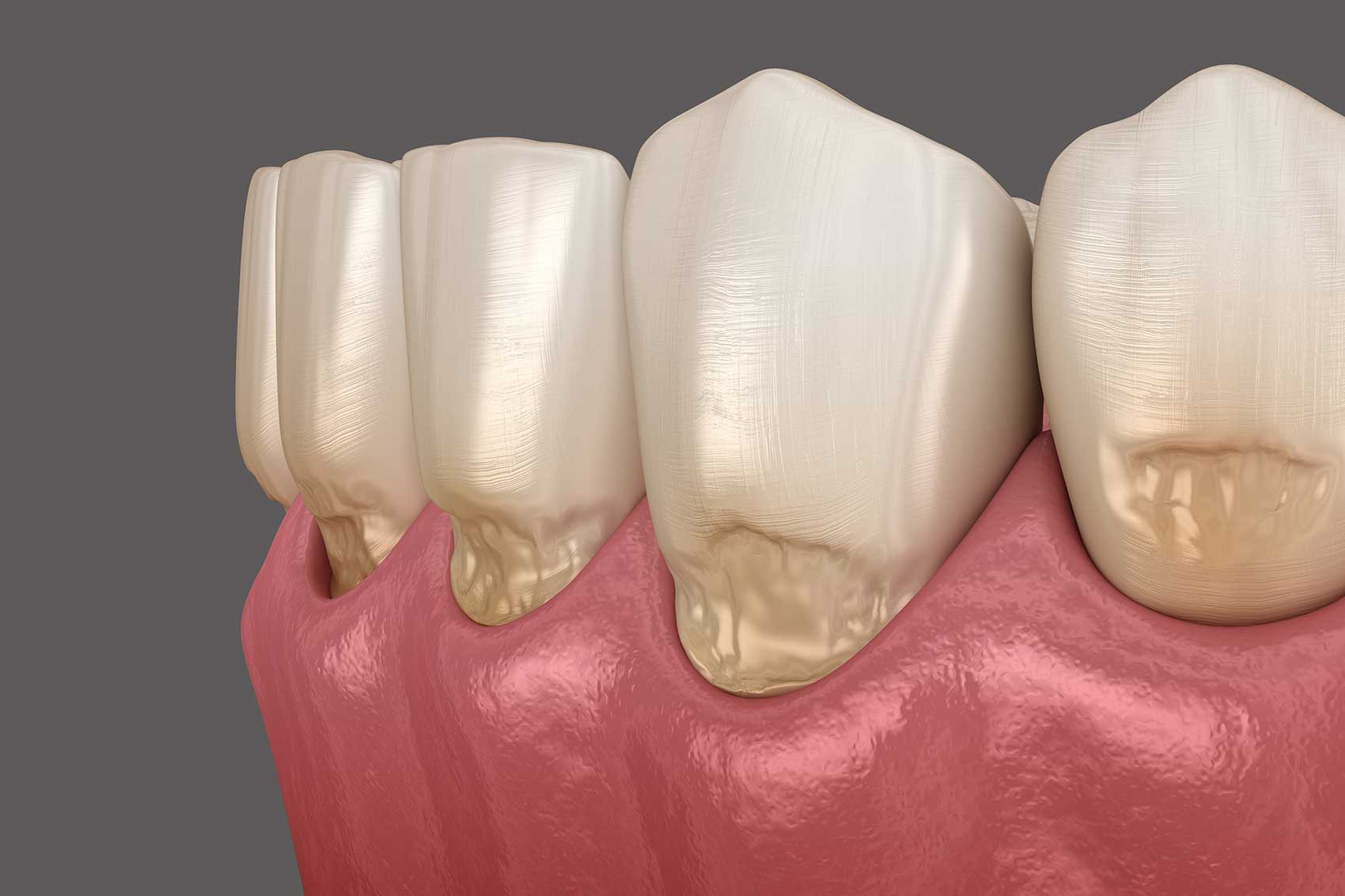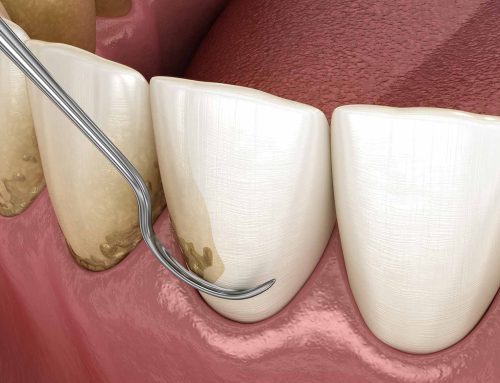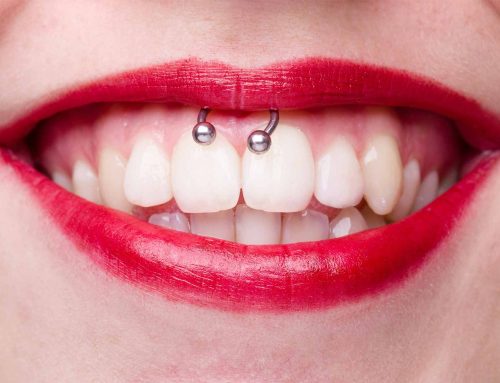Receded gums and tooth loss… Many of us fear these dental problems, but how many of us know the causes, symptoms and possible treatments?
While brushing techniques are partly to blame, other bad habits, as well as certain diseases, can also be at the root of the problem. Tobacco use, gingivitis and periodontitis are just a few examples of situations that could lead your specialist to talk to you about a gum graft. As impressive as the name of this treatment may sound, the technique has become common practice. When you consider that nearly 75 percent of adults in Quebec suffer from various degrees of periodontal disease, it’s easy to understand why so many of them have undergone gum grafts.
That said, are they the only solution to prevent tooth loss? Can you prevent receded gums or at least mitigate the situation? And what are the warning signs of this type of problem? Take the time to learn more about this oral condition so you can change your brushing habits and detect any anomalies in your gums in order to take appropriate action in time.
If you’re worried about your oral health or if you suspect that you may have one or more loose teeth, your first reaction should be to schedule an appointment with your dentist. He or she will be able to arrive at a precise diagnosis and prescribe the necessary treatment.
Causes, symptoms and consequences of loose teeth
Receded gums occur when the gum retracts, exposing part of the root of the tooth. Once the root is exposed, it becomes more sensitive and more fragile because of plaque deposits. This eventually leads to a weakening of the bones supporting the tooth, causing it to become loose and even fall out if the patient fails to seek treatment.
Several factors can lead to periodontal disease, which includes gingivitis and periodontitis. The difference between the two? If gingivitis (inflammation of the gums) isn’t treated in time, it can degenerate into full-blown periodontitis. When a patient has gingivitis, dental plaque accumulates between the gum and the tooth, favoring the creation of a periodontal pocket, which can become filled with bacteria, resulting in inflammation, pain and bleeding. As we’ve mentioned, without treatment, the gums end up receding, causing the tooth to become unstable.
Causes of gingivitis and periodontal disease
Poor oral hygiene is often to blame for gingivitis. If you fail to sufficiently remove dental plaque with each brushing, the plaque will harden, turning into tartar and attacking the gums.
While this may be a common cause, it’s far from being the only one. When it comes to tooth loss, there can be multiple causes:
- Bruxism (teeth grinding) while sleeping
- Smoking
- Using a toothbrush with bristles that are too hard
- Horizontal or overly aggressive brushing technique
- Poorly aligned teeth
- Hereditary and genetic factors
- Diabetes
- Stress
- Certain medications
- Poorly placed dental prostheses
- Pregnancy (the hormonal changes can exacerbate periodontal disease)
In addition to its multiple causes, periodontal disease is typified by its slow progression. It’s even possible for there to be no symptoms or pain until the disease has progressed to the point that it endangers a tooth. That’s one more reason why regular visits to your dentist are so important.
Although periodontal disease can be difficult to detect, we do recommend paying special attention to the following symptoms:
- Teeth that are sensitive to heat, cold or foods that are acidic or sugary
- Teeth that appear to be longer than others because the root has become exposed little by little
- Gums that bleed during brushing
- Red, swollen gums that persist for several weeks
Gum grafts and other possible treatments
- Depending on how advanced periodontal disease is, there are various available treatments:
In the early stages, a full cleaning will suffice to eliminate bacteria and tartar in order to reduce inflammation. - If the disease has advanced to stage two, the dentist may consider open flap debridement (OFD). This practice consists of making an incision in the gums to provide increased access to eliminate the periodontal pockets by scaling. This technique may require one or more visits and offers the advantage of promoting regeneration of the gingival attachment tissues.
- In certain cases, the dentist may choose to prescribe an antibiotic treatment to impede the proliferation of bacteria in the gums and teeth, thus improving the patient’s odds of recovery.
- When the gums are severely receded, this is where a gum graft comes into play. This procedure consists of harvesting a graft from the palate and using it to cover the visible portion of the root. The postoperative pain is easily controlled with analgesics. The wound heals quickly; however, the patient must take certain precautions during the next few weeks when eating and brushing.
- In the event that it’s impossible to save the tooth, the dentist can replace it with an implant.
Preventing tooth loss
As you’re undoubtedly aware, prevention is also an excellent way to protect your teeth and prevent them from becoming loose. The following are among the actions you can take:
- Brush your teeth 30 to 60 minutes after each meal and adopt proper brushing technique (using circular movements, starting at the gum and moving toward the cutting-edge of the tooth)
- Use dental floss
- Use a toothbrush with soft bristles
- Visit your dentist regularly
The specialists at Clinique Dentaire Charles Trottier can advise you and guide you toward better habits to improve your oral hygiene. Don’t hesitate to contact them if you have even the slightest doubt about the health of your gums. They’ll take the time to reassure you and explain which treatment is most effective for your particular pathology.
Sources:
La Presse. La Santé buccodentaire en chiffres [Oral health by the numbers]. 2020.
Santé magazine. Déchaussement des dents : comment l’éviter, quelles solutions ? [Tooth loss: how can you prevent it and what are the solutions?] 2021.
Le Nouvelliste. Récession gingivale. Une alternative à la greffe de gencives [Receded gums. An alternative to gum grafts]. 2019.





